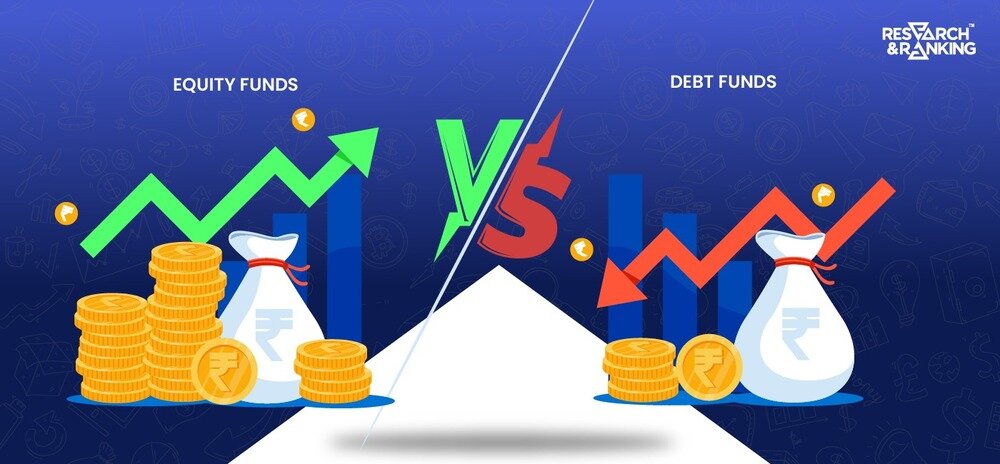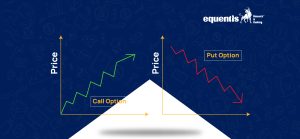Understanding the difference between debt and equity is vital for investors in the wide world of investments. The right mix of debt and equity funds helps diversify portfolios and achieve financial goals quickly. While debt and equity funds offer investment opportunities, they operate on distinct principles and cater to different risk appetites. This article will explore the distinction between debt and equity funds, highlighting their characteristics and advantages. Let’s delve into the inner workings of these funds to get a clear understanding of the difference between debt and equity.
Equity vs Debt Mutual Funds
Equity and debt mutual funds represent two primary investment avenues available to investors. Each type of fund holds a unique position and comes with a different set of risks and return potential.
Understanding Equity Mutual Funds Vs. Debt Mutual Funds
The fundamental difference between debt and equity lies in the underlying assets each invests in. Equity mutual funds primarily invest in companies’ stocks, essentially buying a piece of their ownership. Debt funds, on the other hand, distinguish themselves by investing in fixed-income generating instruments like bonds and government securities. This equity vs debt distinction directly impacts their risk and return profiles.
Equity Funds
Equity funds hold the potential for higher returns due to the inherent growth potential of stocks. However, this distinction between debt and equity comes with a price: increased volatility. The value of equity funds can fluctuate significantly in the short term. These funds are suitable for investors planning to stay in the market longer.
Factors To Keep in Mind Before Investing in Equity Mutual Funds:
- Risk Appetite: Market volatility makes Equity funds inherently riskier than debt funds. Before investing in equity mutual funds, investors should evaluate their risk tolerance.
- Investment Horizon: Investing in equity is more appropriate for long-term goals because of short-term market fluctuations. Investors can get rewards from the equity markets by staying invested for extended periods.
- Diversification: Diversifying investments across various sectors and companies can help mitigate risk in equity funds. Investors should consider diversification strategies to reduce concentration risk.
- Fund Performance: Evaluating the past performance and track record of equity funds can provide insights into the potential returns and risk-adjusted performance.
Debt Funds
Debt funds prioritize capital preservation and regular income generation. By investing in fixed-income securities, they offer lower volatility compared to equity funds. However, this distinction between debt and equity translates to lower potential returns.
Factors To Keep in Mind Before Investing in Debt Mutual Funds
- Risk Profile: Debt funds carry lower risk than equity funds but are not entirely risk-free. Investors should understand the credit, interest rate, and liquidity risks associated with debt funds.
- Investment Objective: Debt funds are ideal for investors seeking regular income and capital preservation. They offer stable returns over the investment horizon, making them suitable for short to medium-term financial goals.
- Interest Rate: Investors should monitor interest rate movements and adjust their investment strategies accordingly. Fluctuations in interest rates can affect the performance of debt funds.
- Credit Quality: Assessing the credit quality of underlying securities is essential for debt fund investors. Higher credit quality securities offer lower risk but may have relatively lower returns.
Equity Fund Vs Debt Fund: Comparative Analysis
Investors should know the difference between debt and equity funds before making investment decisions. It’s crucial to distinguish between debt and equity funds to align investments with individual financial goals and risk tolerance levels.
Now, let’s dissect the key differences between debt and equity through a head-to-head comparison:
| Feature | Equity Fund | Debt Fund |
| Asset Class | Stocks | Bonds, Government Securities |
| Risk | Higher | Lower |
| Returns | Potentially Higher | Lower |
| Volatility | Higher | Lower |
| Investment Horizon | Longer (5+ years) | Varies (Short-term to Long-term) |
| Suitability | Investors with high risk tolerance and long-term goals | Investors seeking stability, capital preservation, or regular income |
Remember, the ideal choice depends on your circumstances and investment goals. Consider seeking professional financial advice to know the difference between debt and equity in the context of your unique needs.
Conclusion
Understanding the difference between debt and equity empowers you to make informed investment decisions. Whether you seek the potentially high returns of equities or the stability of debt funds, remember to distinguish between debt and equity-based financial requirements. You can confidently chart your investment course with careful consideration and a clear understanding of these critical distinctions.
Know more about
SIP CALCULATOR | RETIREMENT CALCULATOR | CAGR CALCULATOR | FINANCIAL CALCULATORS
*Disclaimer Note: The securities quoted, if any, are for illustration only and are not recommendatory. This article is for education purposes only and shall not be considered as recommendation or investment advice by Research & Ranking. We will not be liable for any losses that may occur. Investment in securities market are subject to market risks. Read all the related documents carefully before investing. Registration granted by SEBI, membership of BASL, and certification from NISM in no way guarantee the performance of the intermediary or provide any assurance of returns to investors.
FAQ
What is a debt fund?
A debt fund is a mutual fund type primarily investing in fixed-income securities such as government bonds, corporate bonds, and money market instruments. Debt funds differ from equity funds and focus on generating stable returns with lower risk. The key difference between debt and equity funds lies in their underlying assets and risk-return profiles, with debt funds offering more conservative investment options.
What is the equity market?
The equity market is a platform for buying and selling stocks, shares, and other equity-related securities. It represents ownership interests in companies, allowing investors to participate in their growth and profitability. Unlike the debt market, which deals with fixed-income securities, the difference between debt and equity lies in equity’s ownership component, where investors hold shares representing ownership stakes in companies, subject to market fluctuations.
How useful was this post?
Click on a star to rate it!
Average rating 1 / 5. Vote count: 1
No votes so far! Be the first to rate this post.
I’m Archana R. Chettiar, an experienced content creator with
an affinity for writing on personal finance and other financial content. I
love to write on equity investing, retirement, managing money, and more.
- Archana Chettiar













